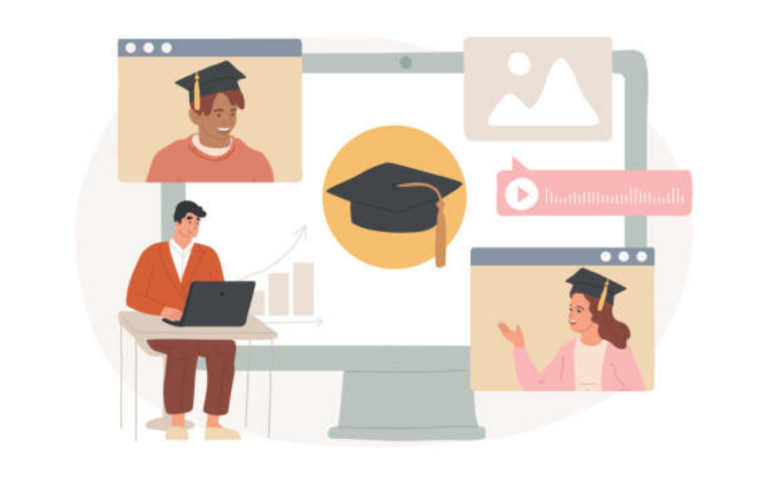The University of Florida eLearning

The University of Florida eLearning, also known as UF eLearning, is an innovative platform that provides a wide range of online educational resources and support for both students and instructors. As the educational landscape continues to evolve, UF eLearning plays a crucial role in ensuring the continuity of education, especially during unexpected disruptions to face-to-face classes. This article will explore the various aspects of University of Florida eLearning, including its features, benefits, and the support it offers to the university community.
Read: Scholarships for Future Teachers
Features of University of Florida eLearning
University of Florida eLearning offers a comprehensive set of features and tools to facilitate online learning and teaching. For instructors, the platform provides guidance on transitioning to remote teaching, including the use of familiar tools and ensuring the accessibility of course content. Additionally, UF eLearning offers support for adapting different assessment types, such as written assignments, quizzes, and exams, to be taken online. This ensures that instructors can maintain the academic integrity of their courses while delivering content in a virtual environment.
For students, UF eLearning offers resources for maintaining connectivity and accessing online learning materials. This includes guidance on participating in virtual synchronous conferences and utilizing new technologies for online learning. The platform also provides access to LinkedIn Learning, which offers over 16,000 online skill-building education options. This allows students to continue their personal and professional development through a wide range of online courses and resources.
Support for the University Community
In addition to its technical features, University of Florida eLearning offers extensive support for the university community. The platform provides resources for faculty to plan instructional activities that ensure the continuity of education in various situations. This support is particularly valuable during unexpected disruptions, as it encourages flexibility and adaptability in both teaching and learning practices.
Furthermore, UF eLearning offers guidance on using Zoom for remote teaching and learning, including recommendations for ensuring privacy and security. This demonstrates the platform’s commitment to providing a safe and effective online learning environment for all users. Additionally, the platform offers resources for internet connectivity, discounted Adobe Cloud subscriptions, and online consultation services, ensuring that students and faculty have the necessary support to engage in online learning and teaching activities.
University of Florida eLearning
The University of Florida’s eLearning program is a department within the College of Education that focuses on enhancing support for innovative and beneficial teaching and collaborative outreach. The department offers various services, including:
– Instructional Design: Creating engaging and effective online courses.
– Web Design: Developing dynamic websites with detailed architecture and intuitive design.
– Video Production: Delivering authentic and effective messaging through various methods.
– Graphic Design: Creating visually appealing materials for online courses.
The university also offers hands-on training for creating and updating online courses on UF’s e-learning system. Participants learn how to apply course design best practices and management strategies to create engaging online courses.
For on-demand online courses, the University of Florida provides the myTraining system, which allows users to register and access courses using their GatorLink username and password. The myTraining system supports various web browsers, including Chrome, Firefox, Safari, and Chrome for Windows and Mac users, respectively.
eLearning at UF is powered by Canvas, an advanced learning management system, and provides a secure online system for student submissions, assessments, posting grades, and communication among class participants. A GatorLink account is required to access e-Learning, and users are expected to abide by the university’s privacy, acceptable use, intellectual property, copyright, and other related policies.
How has elearning Impacted the University of Florida
The impact of eLearning on the University of Florida has been significant. The University of Florida eLearning platform provides a wide range of online educational resources and support for both students and instructors. The platform offers guidance on transitioning to remote teaching, adapting different assessment types, and ensuring the accessibility of course content.
For students, UF eLearning provides resources for maintaining connectivity, accessing online learning materials, and personal and professional development through LinkedIn Learning.
The platform also offers extensive support for the university community, encouraging flexibility and adaptability in teaching and learning practices, and providing guidance on using Zoom for remote teaching and learning, ensuring privacy and security, and offering resources for internet connectivity and online consultation services.
The University of Florida eLearning has played a crucial role in ensuring the continuity of education, especially during unexpected disruptions to face-to-face classes.
The platform has enabled seamless transitions to online learning and teaching environments, ensuring that students and instructors have the necessary support to engage in online learning and teaching activities.
What is the Process for Paying Tuition Fees in ONE.UF
To pay tuition fees in ONE.UF, the University of Florida offers several payment options, which are prioritized to pay the oldest charges on a student’s account. Students can make payments via electronic check (e-check), credit/debit card, or international payment through the ONE.UF portal under the Campus Finances (Bursar) section. The university has also partnered with Convera and Flywire to provide fast and convenient international payment options.
Additionally, students can pay at the University Bursar office with personal checks, cashier’s checks, and money orders, which can be placed in the 24-hour drop box located outside 113 Criser Hall. The fee payment deadline is 3:30 p.m. on the last day of the second week of classes, and students can estimate their tuition and fees on the University Bursar website.
The University Bursar will automatically bill the Florida Prepaid Program for the tuition and applicable fees each term that a student is registered at UF and continues to have Florida Prepaid Program coverage.
How to Set up a Payment Plan for Tuition Fees in ONE.UF
To set up a payment plan for tuition fees in ONE.UF, follow these steps:
1. Log in to ONE.UF, the University of Florida’s online student portal.
2. Navigate to the Campus Finances (Bursar) section and select “View My Account”.
3. Choose “Payment Plan” and follow the prompts to enroll.
4. Pay a non-refundable $75 administrative fee to enroll in the plan.
5. Pay a down payment of 25% of the account balance to enroll in the plan.
6. Three additional payments are due over the next three months, on or around the 10th of the month, resulting in a total of four payments per term.
If you are unable to pay the account balance in full before the due date, a payment plan is available to cover tuition, housing, meal plans, Carolina Cash during the optional fee period, mailbox fee, and other related fees.
How to Register for Courses in ONE.UF
To register for courses in ONE.UF, follow these steps:
1. Log in to ONE.UF, the University of Florida’s online student portal.
2. Navigate to the Schedule of Courses, located under the program dropdown.
3. Choose the courses you want to take, including backups.
4. Take care of any registration holds.
5. Create your schedule in ONE.UF.
6. Print a copy of your schedule each time you register.
To add a course to your schedule in ONE.UF, follow these steps:
1. Click Register/View Schedule.
2. Click the View Schedule button.
3. Click + Add Course.
4. Enter a filter and click SEARCH.
5. Classes with the specified criteria will display. Click the desired course to see the available offerings.
6. Click the + Add Class next to the desired course.
How to Access the Schedule of Courses for UF Online or pace
To access the schedule of courses for UF Online or PaCE, follow these steps:
1. Log in to ONE.UF, the University of Florida’s online student portal.
2. Navigate to the Schedule of Courses, which is located under the program dropdown.
3. Review the available courses for the desired term, including backups.
For more information on registering for classes and other related processes, you can refer to the UF Online Handbook or contact the UF Online Academic Strategies team at 352-273-4478.
Conclusion
University of Florida eLearning is a comprehensive platform that offers a wide range of features and support for online learning and teaching. By providing resources for both students and instructors, the platform plays a crucial role in ensuring the continuity of education, especially during unexpected disruptions. With its emphasis on flexibility, adaptability, and accessibility, UF eLearning is a valuable asset to the University of Florida community, enabling seamless transitions to online learning and teaching environments.
The University of Florida eLearning has been developed to provide a comprehensive set of features and tools to facilitate online learning and teaching. For instructors, the platform offers guidance on transitioning to remote teaching, adapting different assessment types, and ensuring the accessibility of course content. For students, UF eLearning provides resources for maintaining connectivity, accessing online learning materials, and personal and professional development through LinkedIn Learning.
The platform also offers extensive support for the university community, encouraging flexibility and adaptability in teaching and learning practices, and providing guidance on using Zoom for remote teaching and learning, ensuring privacy and security, and offering resources for internet connectivity and online consultation services.






